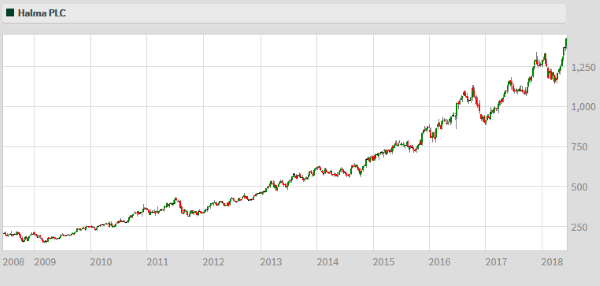Halma: A reassuringly expensive FTSE 100 star
12th June 2018 12:42
by Graeme Evans from interactive investor
Now that Halma is finally in the FTSE 100 big league after four decades rising up the stockmarket ranks, it's comforting to see that this hugely impressive growth stock is still managing to tick off the milestones.
There were plenty of notable achievements in today's maiden blue-chip annual results, with record profit for the 15th consecutive year after revenues surpassed £1 billion for the first time. The final dividend was up 7% for the 39th consecutive year of showing a DPS increase of 5% or more.
For investors possibly turning to Halma for the first time following last December's FTSE 100 promotion, it’s fair to say that all this doesn't come cheap. Halma has a projected 2019 price earnings (PE) multiple of 28.8x, according to Investec, but the broker's analysts still think there's more to come from shares due to record cash flow and a gross margin well over 60%.
Halma's long-established, enhanced growth strategy has been built around a current portfolio of 41 subsidiary companies operating worldwide, with technology focused on hazard detection, life protection, personal and public health improvement and environmental protection.
The portfolio structure enables Halma to easily integrate new acquisitions as well as to merge or sell businesses should the longer-term market potential change adversely. This means Halma can grow rapidly without becoming too complex, although as chief executive Andrew Williams told interactive investor there’s no danger of Halma ever being forced into hasty purchases.
The company shuns costly auction processes and typically takes two or three years to get deals over the line following a lengthy period getting to know business owners and the markets they operate in.
In the last financial year, Halma spent £116 million on five deals across three sectors but the company could be tracking as many as 300 or 400 other companies during that time.
It's a strategy that continues to pay off as Halma is now able to generate £1.08 billion from 41 operating companies, compared with the £398 million made from 39 firms just a decade ago. Over a 30-year period, compound revenue growth has been 11%, with growth in all but two of those years.

Source: interactive investor Past performance is not a guide to future performance
Its trading prospects also appear bright, with China's increased focus on safety, healthcare and cleaner air playing to many of Halma's strengths. As a result, Asia Pacific revenues exceeded the UK's for the first time today after an increase of 15% to £175 million. China accounted for nearly half that figure.
Despite technological and geopolitical change impacting individual regions and industries, Williams said Halma's market and geographic diversity, as well as its business model, served as important assets in the current climate.
The company's cash generation continues to be strong, while its gearing at the year-end of 0.87 times is well below its targeted range of 1-2 times and leaves sufficient headroom to support future investment.
Getting the balance right between that acquisitive growth and rewarding shareholders will continue to be a challenge, which is one reason why the projected dividend yield is stuck at 1.1%.
But what investors have got instead is a stock with a long track record of growth.
Investec thinks the premium rating is justified and has raised its target price to 1,510p from 1,320p, although it has moved to an 'add' recommendation after the recent run for the shares.
These articles are provided for information purposes only. Occasionally, an opinion about whether to buy or sell a specific investment may be provided by third parties. The content is not intended to be a personal recommendation to buy or sell any financial instrument or product, or to adopt any investment strategy as it is not provided based on an assessment of your investing knowledge and experience, your financial situation or your investment objectives. The value of your investments, and the income derived from them, may go down as well as up. You may not get back all the money that you invest. The investments referred to in this article may not be suitable for all investors, and if in doubt, an investor should seek advice from a qualified investment adviser.
Full performance can be found on the company or index summary page on the interactive investor website. Simply click on the company's or index name highlighted in the article.